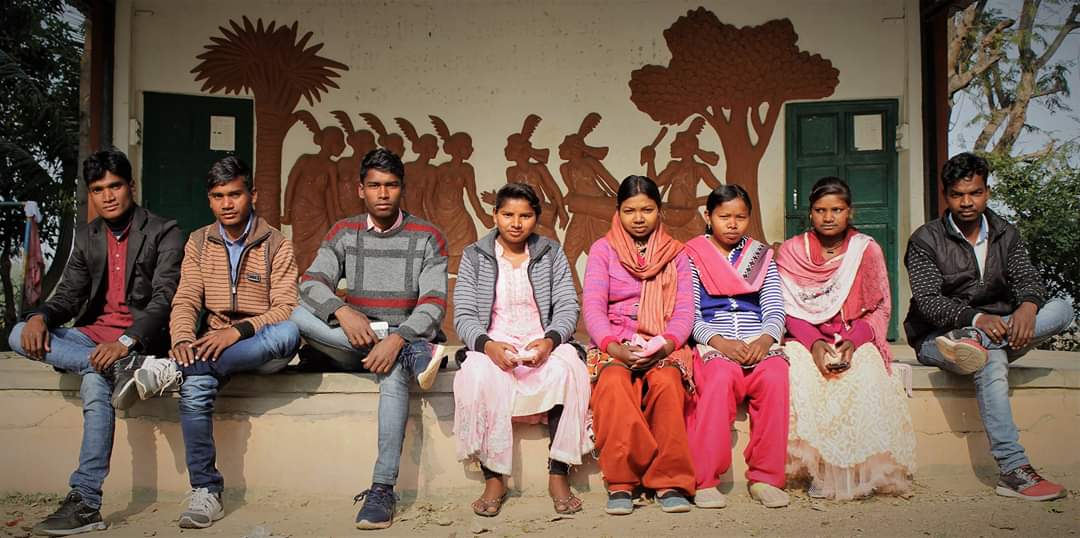Submitted by Sarah Bailey on Thu, 19/12/2019 - 13:39
Owing to the sheer diversity of the nation, development work in India is inextricably linked to ethical challenges. These challenges become more intense when ‘development’ translates across marginalised communities, who already have a long history of exploitation. Here, Gautam Bisht and Shuvajit Chakraborty from TIGR2ESS Flagship Project 1 collaborator PRADAN highlight the work of youth group Lahanti Club, which is invested in transforming an alienating education system into one which is inclusive of indigenous socio-cultural capital.
In the global South, the notion of ‘community’ and the associated practices of solidarity and sharing have long held considerable importance. This is particularly true in rural areas of central India, inhabited by the Scheduled Tribes, internationally referred to as indigenous people. However, developmental efforts have focused on the outreach of the state and market, putting much pressure on the traditional socio-cultural-political systems of these communities. Rapid technological changes have only acted as a catalyst for this face-off.
In the rites of passage from their ‘underdeveloped’ living conditions to a state of development, indigenous communities are now facing what is called a liminal situation. Liminal spaces stand for a collapse of old orders and fixed meanings, with colliding worldviews and lifestyles entailing a simultaneous play of creation and destruction.
Collective action for community development
At PRADAN, we do not view community building as instrumental in achieving developmental ends, but rather an act of development in itself. Lahanti Club, based on the Santhali word to ‘become more’, is one such initiative, established in 2018 in Jamui district of South Bihar.
Jamui is profiled as one of the most ‘underdeveloped’ districts in the country, lagging behind considerably in sustainable development goals (SDGs) 3 (Nutrition) and 4 (Education). It is also marred by what is termed ‘left-wing extremism’ and its violent confrontation with the State. In such a volatile atmosphere, Lahanti Club is a collective space forged together by indigenous youth (young men and women) for critical discussions on their perspectives of what development should entail.
Transforming the education system through creative practice
The club decided to respond to the alarming rate of school drop outs in the region. They understood that one of the factors that results in high drop outs is an imposed learning system that alienates and often humiliates local children. The school ignores their mother tongue, context and culture and some textbooks portray the community in a very poor light.
To tackle this issue, Lahanti Club established post-school community learning centres and worked with the government schools to supplement education for children aged 4-16 years. They adopted a framework to build on existing community resources, focusing on their mother tongue, myths, stories and culture. Their pedagogy includes play, performance, traditional arts and digital creative expression like Photo-Voice. This was crucial in responding to the ‘colonising’ tendencies of formal schooling, where learning comes at the cost of a systematic forgetting of one’s own roots.
The youth club has also engaged with community adults through a digital interface of governance and local citizenship, to counter significant corruption in the region. Our role at PRADAN is to assist the collective by building capacity in life skills, facilitation, teacher training, digital literacy, social impact and enhancing the club’s own visioning.
Benefiting from collaboration with researchers
Lahanti Club’s association with TIGR2ESS earlier in 2019 has helped to consolidate their approach to contextual learning. Focused group discussions (FGDs) and content transcription and translation have allowed the club to reflect on the consequences of changing patterns of agriculture, food choices and nutrient deficiency.
Through this ongoing collaboration, the club has also come to realise how educational achievement in school is associated with low nutritional intake. This triggered the club to create school food gardens, with the help of children, to promote a culture of activity based group learning. More importantly, these gardens have ensured much needed additional nutrition for children.
Another offshoot from the TIGR2ESS FGDs has been the creation of school herbariums. This initiative was launched in response to a drastic decline in local knowledge systems around non-cultivable forest food items and herbs. The herbariums provide an archive of this local knowledge, created with the help of children and their ‘illiterate’ grandparents, and have successfully brought indigenous knowledge into the formal learning space. The scheme has also initiated a dialogue around the need to preserve this knowledge system to sustainably cope with the nutritional and health challenges the community faces.
Scaling-up impact
Following a recent Global Research Translation Award (GRTA) from UK Research and Innovation (UKRI), Lahanti Club will be involved in scaling-up the impact of TIGR2ESS research. They will play a crucial role in developing a digital portal of local food systems and health practices, expressed through creative practice.
The club will support women from Self Help Groups to use digital technology so as to generate content on diversified agriculture, non-cultivable food items and herbs. They will also upscale the school food gardens and herbariums over a wider geography.
Communities and collectives are crucial in ensuring that development is decentralised towards a bottom-up approach. In that sense, Lahanti Club is an emerging community-rooted initiative aiming to critically negotiate with markets and the state, as well as tackling the oppressive elements of their own cultural practices. For indigenous youth, who have a general apathy to civic engagement and a general disillusionment around their prospects in life, Lahanti Club offers a ray of hope.
Further information about Lahanti Club can be found on their Facebook page and YouTube channel.

